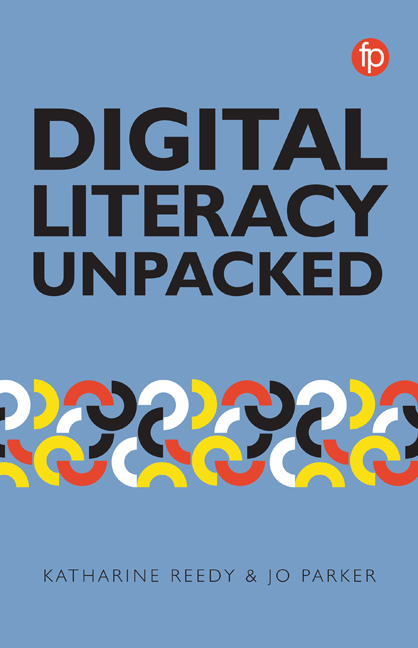Book contents
- Frontmatter
- Contents
- List of figures and case studies
- Foreword
- Notes on Contributors
- Introduction
- Part I Approaching Digital Literacy
- Part II Learning in a Digital World
- Part III Developing Staff Digital Literacies
- 8 D4 Curriculum Design Workshops: a Model for Developing Digital Literacy in Practice
- 9 #CreativeHE: an Animated Google Plus Platform for Challenging Practitioners to Think Differently
- 10 Developing Library Staff Digital Literacies
- Part IV Digital Citizens and Workers
- Conclusion
- Index
8 - D4 Curriculum Design Workshops: a Model for Developing Digital Literacy in Practice
from Part III - Developing Staff Digital Literacies
Published online by Cambridge University Press: 24 September 2019
- Frontmatter
- Contents
- List of figures and case studies
- Foreword
- Notes on Contributors
- Introduction
- Part I Approaching Digital Literacy
- Part II Learning in a Digital World
- Part III Developing Staff Digital Literacies
- 8 D4 Curriculum Design Workshops: a Model for Developing Digital Literacy in Practice
- 9 #CreativeHE: an Animated Google Plus Platform for Challenging Practitioners to Think Differently
- 10 Developing Library Staff Digital Literacies
- Part IV Digital Citizens and Workers
- Conclusion
- Index
Summary
Introduction
Finding effective strategies to engage academic staff in developing their digital literacies is a challenge familiar to the higher education sector. The Association for Learning Technology (ALT) examined uptake of digital practices in the UK further and higher education sectors and found teacher time to be a significant part of this challenge (Laurillard and Deepwell, 2014). Similarly, the Universities and Colleges Information Systems Asso - ciation (UCISA) identified that staff development is the most commonly cited issue for institutions when considering develop ment of digital capability (overtaking technical infrastructure and legal and policy issues) (Walker et al., 2016, 3). Many academic staff might be described as ‘hard to reach’ to participate in training and other staff development courses (Newland and Byles, 2014, 322). In the Rogers’ (2003) model for the diffusion of an innovation in organisations, this group has been termed the late adopters, and members are characterised as being cautious about their use of technology, more sceptical about the benefits of technology than the early adopters, and unlikely to adopt a particular technology until it is used by the majority (Kahn and Pred, 2001). Despite a plethora of staff development activities, online learning opportunities and other academic development initiatives, finding ways to encourage and motivate lecturers to make better use of technology remains a difficult challenge to address.
We have found that there are dangers in focusing on the lack of digital competency of academic staff as this problematises the skills and practices of the academic staff and is experienced as blaming them for being deficient. In response they often act defensively, attacking the need for these skills, or seeking to locate the teaching of digital skills in other parts of the students’ experience (their study at school, the support from the library). We wanted to approach the issue in a different way, to use the curriculum as a way to motivate and engage academics.
This chapter describes the approach that we designed and have been running for the last few years at the University of Huddersfield, a D4 (Discover, Dream, Design, Deliver) Curriculum Development Model. The model is based on working within course teams to examine digital literacy from the perspective of students’ skills and practices and how they are developed within the taught curriculum.
Information
- Type
- Chapter
- Information
- Digital Literacy Unpacked , pp. 111 - 122Publisher: FacetPrint publication year: 2018
Accessibility standard: Unknown
Why this information is here
This section outlines the accessibility features of this content - including support for screen readers, full keyboard navigation and high-contrast display options. This may not be relevant for you.Accessibility Information
- 2
- Cited by
